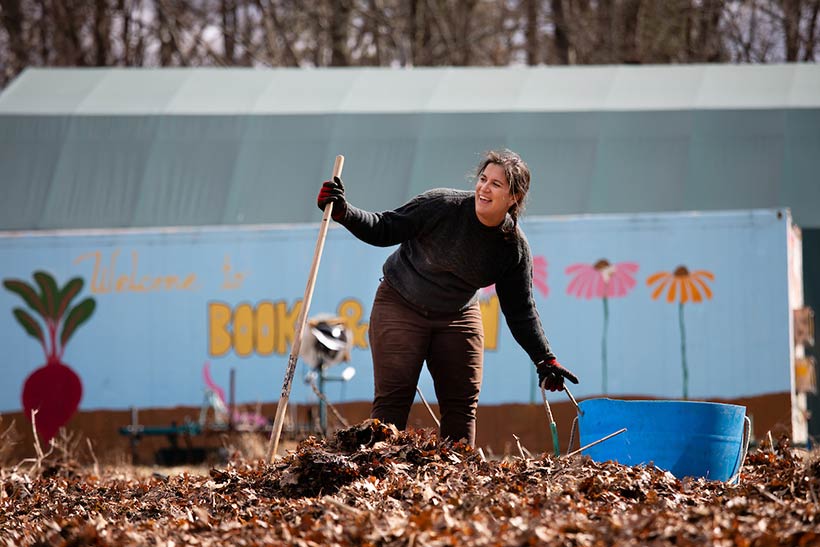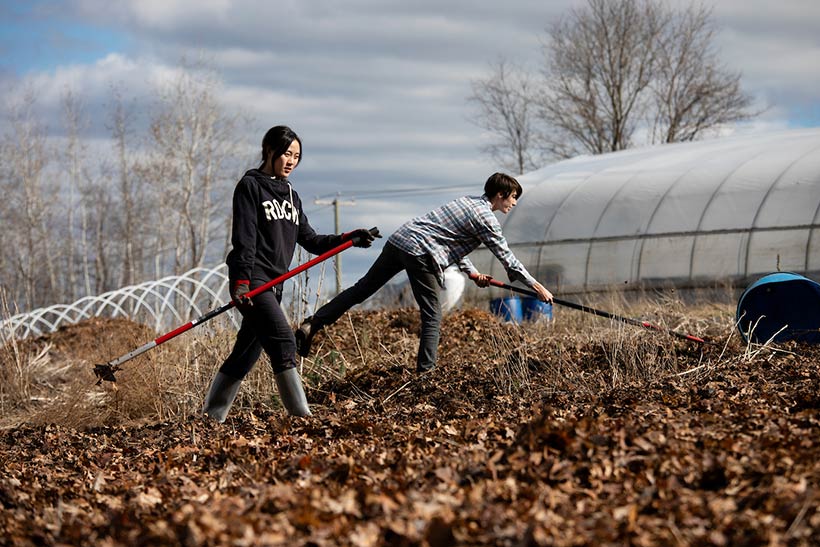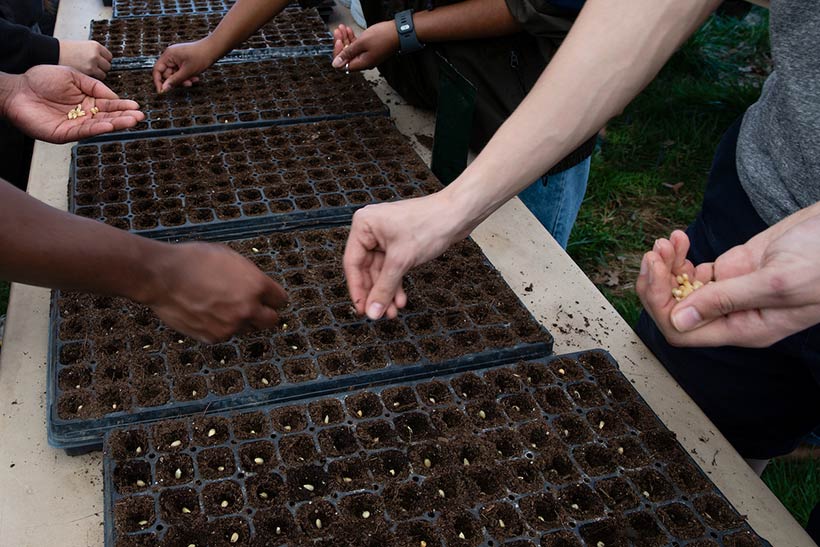
Want to understand the impact of climate change? Talk to a farmer.
That’s what professors Kate Sims and Ashwin Ravikumar did last semester. They invited Maida Ives (pictured above), manager of farm education and operations at the Book & Plow Farm, to lead a session of their senior seminar.
The perspective of a real-life farmer—and one who happens to grow food for the campus dining hall—brought home the realities of a changing climate. The class visit to the farm came in the midst of an exceptionally rainy fall, the kind climate models predict will soon become more frequent in New England. “Maida spoke compellingly about the challenges of the wet weather and how it had affected the yields across different crops,” says Sims, an associate professor of economics and environmental studies. “She also talked about how the campus farm had adapted.”
Adapting and evolving is something that the farm has done often in the six years since its founding by a group of Amherst College students and faculty. In 2016, the Book & Plow transitioned from a commercial farm to a department within the College’s Office of Environmental Sustainability. Every year, the farm produces more than 40,000 pounds of food and employs nearly 40 student farmers.
With Ives at the helm, the Book & Plow Farm has also become a wellness resource and teaching tool, which keeps finding its way into new corners of the curriculum.
The wellness piece is “pretty universal” among campus farms, explains Ives, noting their utility in a moment when colleges are increasingly attentive to their students’ mental health. “For me, farming and wellness feel 1,000 percent tied together,” Ives says, “because it’s working outside, working with people and creating something healthful I can share.”

Samantha Schriger ’20 has worked on the farm for all three of her years at Amherst, and says it has given her “a sense of place.” The former Los Angeles resident praises Ives and the Book & Plow’s assistant farm manager, Kaylee Brow (pictured above on the right), for making the farm so inclusive.
As a result of working on the farm, “I appreciate my food more now,” Schriger says. “I know what it takes to get everything on the plate, and have a sense of the labor, energy and time that’s involved in getting it to me.” She credits the working conditions at the Book & Plow—where student farmers are fed, offered sunblock and encouraged to take frequent water breaks—for deepening her perspective on many topics covered in her sociology classes, from migrant farm labor to structures of oppression.
Ives, who spent years as a middle school math teacher before getting into farming, agrees that she and Brow have created an unusual work culture at the Book & Plow. “Our desire to center and prioritize student well-being comes from having been in working environments that weren’t necessarily that caring,” she says.
Growing up in suburban Connecticut and later in Newton, Mass., Ives had no exposure to farming or even to backyard gardening until she went to college. Her interest in food systems grew stronger after she moved to New York to teach in a public school. Stressed and unhappy, she found solace volunteering in a community garden. She gave her students extra credit for working in the garden at their school.
While Ives is no longer a classroom teacher, the qualities that first drew her to teaching remain. She’s naturally curious and, according to the students who work with her, preternaturally calm. In her own words, she is “good at trusting or instilling in others the feeling that they can take on a difficult job.”
“I’m also strong,” she laughs. “I kind of max out our physical lifting capacity at the farm, which is significant.” Yet she has an unconventional approach for dealing with metal farm objects that have rusted or frozen together: “I always ask, ‘Did you tap on it lightly with a wrench?’ We can use brute muscle, but sometimes it’s better just to offer a little bit of encouragement.”
That light, encouraging touch has been a boon to the Book & Plow’s summer interns, who pursue individual research projects with Ives’s support. It also explains why even students who have never worked at the farm seek out Ives for help with class projects. One environmental studies major recently dropped by Ives’ office in Facilities to talk about the types of tomatoes grown by the Book & Plow, pest and disease pressures, and the local tomato market. “Even if the farm is not a formal classroom itself, hopefully more and more people are talking about agriculture or vegetables, and they know that they can reach out to us,” says Ives.
This semester, American studies professors Lisa Brooks and Kiara Vigil tapped Ives to deliver a guest lecture in their class “When Corn Mother Meets King Corn,” which examines the cultural significance of corn in the history of the Americas. The course culminated with a trip to the Book & Plow Farm, where the students planted four varieties of corn, as well as flowers and luffa.

Julia Herion-Cruz ’19, of New Mexico, was one of the 22 “Corn Mother” students who helped Ives construct a shade tent for their planting activity. The chance to interact with the farm, where she had previously worked, was a big reason she enrolled in the course. For her final project, Herion-Cruz asked Ives for help in researching the no-till method for farming, which keeps both nutrients and climate-changing carbon in the soil.
Ives was happy to oblige, and says, “Even when I was a middle school math teacher, that was my favorite part: Learning with the people who are called ‘students.’”
